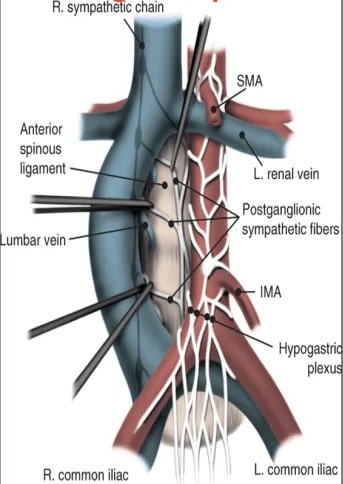Retroperitoneal Lymph Node Dissection
Why Retroperitoneal Lymph Node Dissection (RPLND) is Required?
Testis cancer usually involves one testicle, but in some cases both are affected. About 90–95% of testicular cancers start in the cells that develop into sperm – these are known as germ cells.
Sometimes testicular cancer can spread to lymph nodes in the abdomen, or to other parts of the body. In Australia, retroperitoneal Lymph Node Dissection (RPLND) is often the treatment of choice in patients with persistent enlarged lymph nodes suspicious of testicular cancer after chemotherapy.
What is a Retroperitoneal Lymph Node Dissection?
Depending on the type and stage of the cancer, some lymph nodes at the back of the abdomen (around the large blood vessels known as the aorta and inferior vena cava) may also be removed.
Only a minority of patients with testicular cancer need to have lymph nodes removed, so it’s important to discuss this (and the possible alternatives) with Dr Kim.
Retroperitoneal Lymph Node Dissection (RPLND) is a complex and long operation.
A large incision is typically made down the middle of the abdomen to remove the lymph nodes. It should be performed by a surgeon who has significant experience in the procedure as it is associated with potential serious side effects or complications.

RPLND Anatomy
Open RPLND Surgery
The standard approach involves open surgery, with a large cut made from the breastbone to below the bellybutton. The surgeon moves the organs out of the way, then removes the affected lymph nodes from the back of the abdomen (the retroperitoneum).
Dr Kim can give you more information about this operation.
Robotic RPLND Surgery
Depending on the nature and location of the tumour Retroperitoneal Lymph Node Dissection (RPLND) can also be performed using robotic techniques as it would significantly enhance recovery due to its minimally invasive nature.
Side Effects
Most side effects from this surgery tend to be temporary. Typically pain and discomfort around the operation site are the most common side effects, but this pain can be managed with painkillers, and should subside over time.
Surgery to remove retroperitoneal lymph nodes is a major operation. Serious complications are not common, but they can happen. About 5% to 10% of patients have temporary complications after surgery, such as bowel obstruction or wound infections.
The standard approach for an RPLND requires a large incision in the abdomen, which will leave a scar and can take some time to heal. Mobility will be limited for some time after the operation. This is less likely with robot-assisted laparoscopic surgery, which uses much smaller incisions.
This type of surgery does not cause impotence – a man can still have erections and sexual intercourse. But it might damage some of the nerves that control ejaculation. If these nerves are damaged, when a man ejaculates, the semen is not propelled forward through the urethra to exit the body but rather goes backwards into the bladder. This is known as retrograde ejaculation, and it can make it hard to father children naturally.
To save the normal ejaculation function, surgeons have developed a type of retroperitoneal lymph node surgery called nerve-sparing surgery that is very successful when done by experienced surgeons.
Testicular cancer often affects men at an age when they may be trying to have children. These men may wish to discuss nerve-sparing surgery with their doctors, as well as sperm banking (freezing and storing sperm cells obtained before treatment).
